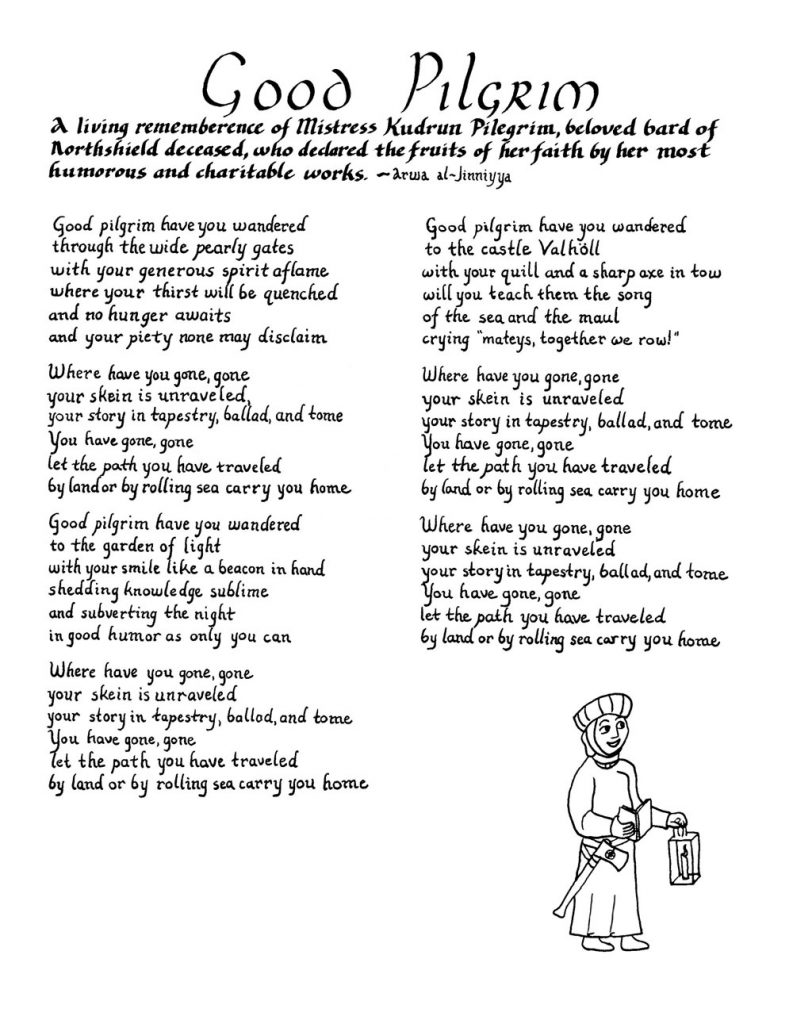Inspiration:
Good Pilgrim is a tribute to Kudrun Pilegrim, a beloved Northshield bard who passed unexpectedly on December 24, 2020. I learned of her passing two days later and completed this song on that same day.
Lyrics:
good pilgrim have you wandered
through the wide pearly gates
with your generous spirit aflame
where your thirst will be quenched
and no hunger awaits
and your piety none may disclaim
chorus:
where have you gone, gone, your skein is unraveled
your story in tapestry, ballad, and tome
you have gone, gone, let the path you have traveled
by land or by rolling sea carry you home
good pilgrim have you wandered
to the garden of light
with your smile like a beacon in hand
shedding knowledge sublime
and subverting the night
in good humor as only you can
(chorus)
good pilgrim have you wandered
to the castle Valhöll
with your quill and a sharp axe in tow
will you teach them the song
of the sea and the maul
crying “mateys, together we row!”
(chorus x2)
On the words:
The lyrics overall explore some possible heavens to which Kudrun may have gone and what she might do there.
Verse one: Christian heaven, with a reference to Kudrun’s song, Pious Lady.
Pearly gates is an informal name for the gateway to Heaven according to some Christian denominations. It is inspired by the description of the New Jerusalem in Revelation 21:21: “The twelve gates were twelve pearls, each gate being made from a single pearl.”[1]
[1] Lang, J. Stephen (2003). “59: Imagine the Size of Those Oysters”. What the Good Book Didn’t Say: Popular Myths and Misconceptions About the Bible. Citadel Press. p. 185. ISBN 9780806524603.
Verse two: Islamic heaven, sometimes called the Garden of Delight, with a reference to Kudrun’s song, SCA Librarians.
Still an afterlife destination of the righteous is conceived in Islam as Jannah (Arabic: جنة “Garden [of Eden]” translated as “paradise”). Regarding Eden or paradise the Quran says, “The parable of the Garden which the righteous are promised: Beneath it flow rivers; perpetual is the fruits thereof and the shade therein. Such is the end of the righteous; and the end of the unbelievers is the Hellfire.”[Quran 13:35] Islam rejects the concept of original sin, and Muslims believe that all human beings are born pure. Children automatically go to paradise when they die, regardless of the religion of their parents.
Paradise is described primarily in physical terms as a place where every wish is immediately fulfilled when asked. Islamic texts describe immortal life in Jannah as happy, without negative emotions. Those who dwell in Jannah are said to wear costly apparel, partake in exquisite banquets, and recline on couches inlaid with gold or precious stones. Inhabitants will rejoice in the company of their parents, spouses, and children. In Islam if one’s good deeds outweigh one’s sins then one may gain entrance to paradise. Conversely, if one’s sins outweigh their good deeds they are sent to hell. The more good deeds one has performed the higher the level of Jannah one is directed to.
Verses which describe paradise include: Quran 13:35, Quran 18:31, Quran 38:49–54, Quran 35:33–35, Quran 52:17–27.
The Quran refer to Jannah with different names: Al-Firdaws, Jannātu-′Adn (“Garden of Eden” or “Everlasting Gardens”), Jannatu-n-Na’īm (“Garden of Delight”), Jannatu-l-Ma’wa (“Garden of Refuge”), Dāru-s-Salām (“Abode of Peace”), Dāru-l-Muqāma (“Abode of Permanent Stay”), al-Muqāmu-l-Amin (“The Secure Station”) and Jannātu-l-Khuld (“Garden of Immortality”). In the Hadiths, these are the different regions in paradise.[64]
[64] Sunan Ibn Majah Vol. 5, Book 37, Hadith 4331
Verse three: Norse heaven, with a reference to Kudrun’s song, Haul on the Oars.
In Norse mythology, Valhalla (/vælˈhælə, vɑːlˈhɑːlə/;[1] from Old Norse Valhöll “hall of the slain”)[2] is a majestic, enormous hall located in Asgard, ruled over by the god Odin. Chosen by Odin, half of those who die in combat travel to Valhalla upon death, led by valkyries, while the other half go to the goddess Freyja‘s field Fólkvangr. In Valhalla, the dead warriors join the masses of those who have died in combat (known as the Einherjar) and various legendary Germanic heroes and kings, as they prepare to aid Odin during the events of Ragnarök. Before the hall stands the golden tree Glasir, and the hall’s ceiling is thatched with golden shields. Various creatures live around Valhalla, such as the stag Eikþyrnir and the goat Heiðrún, both described as standing atop Valhalla and consuming the foliage of the tree Læraðr.
[2] Orchard (1997:171–172).
Chorus: No matter where she has gone, Kudrun will not be forgotten.
Lyrics to two of the three songs referenced above by Kudrun can be found on the MidBards & Friends website.
On the melody:
In keeping with Kudrun’s devotion to music that makes people smile, this song is in a major key with a peppy, uplifting melody. The rising notes beginning the chorus are intended to help counteract the sadness of the subject matter.
The beginning of the verse has overtones of Oh My Darling, Clementine, which is “a mock-serious ode to the narrator’s deceased lover, who drowned after she stubbed her toe and fell in the river.” The melodic similarity was a happy accident that I only noticed afterward, but I think Kudrun would have enjoyed the association.
https://www.songfacts.com/facts/traditional/oh-my-darling-clementine
The last notes of the verse intentionally tie to Kudrun’s song, Haul on the Oars.

